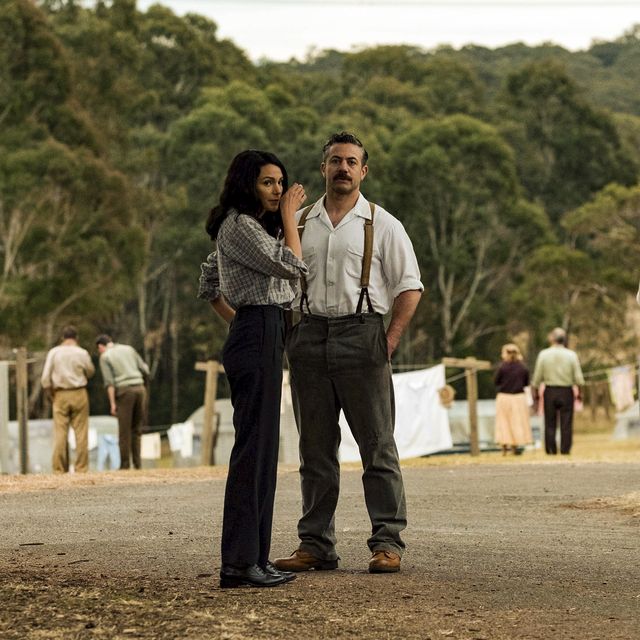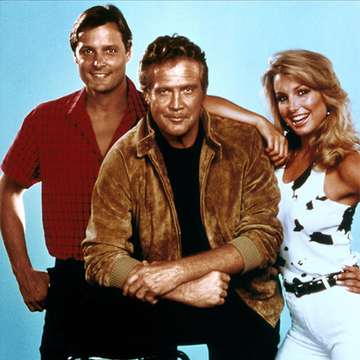The Beeb is kicking off the summer with an epic period drama, Ten Pound Poms, which covers the true story of people from the UK who left the country in the 1940s and moved to Australia to start new lives for just £10.
But, despite the alluring posters promising an easy life in the dazzling sunshine, most people found it quite the opposite. As the actors Warren Brown (Luther, Strike Back) and Michelle Keegan (Brassic, Our Girls) and their characters discover on their arrival. “They lied to us,” one woman says in the trailer. “They showed us white washed houses and huge gardens”, while in reality, they were housed in what looked like “prisoner of war camps”. And that’s before the locals began “welcoming” them…
So what was the truth behind this real-life evacuation of more than a million Britons to Australia? Let’s dig in and find out:
The backstory
After World War II, Australia and New Zealand were looking to populate their countries, so in 1945 the Government started the Assisted Passage Migration Scheme. Post-war, there were booming industries in the country, but not enough workers, so the scheme was part of what was known as the “populate or perish” policy. Two years later, the government of New Zealand also began the project to promote their country to the Brits.
A mass marketing campaign began in the UK, with billboards promising that Australia was like “Britain in the sun”, but with plenty of job prospects, and with other adverts and brochures showing laughing, sun-kissed families flourishing Down Under, it was easy to see how it would be of great appeal to families looking to escape a grey life in a country trying to rebuild itself after the war.
The name the “10 pound poms” is said to have come from the old label attached to British convicts sent to Australia; it was, according to the BBC, a play on the word “immigrant”, which sounded like “pomegranate”, shorted to “pom.” The £10 bit was because the one-way ticket (dubbed “the bargain of a lifetime”) out there cost exactly that – around £350 in today’s money, although kids under 19 travelled free – promising a six-week boat journey and help getting settled in this country on the other side of the planet.
However, when they arrived, The Guardian notes that they were subject to “pommie bashing” and racism from some of the locals, who feared for their jobs. Then there was the stifling heat, the brutal landscape of where they needed to settle and overwhelming amounts of homesickness.
The housing, rather than being white picket fences in lush gardens, were instead migration hostels, often metal Nissen huts or old army barracks. Then, like any deal that seems too good to be true, there was a catch: migrants had to commit to spending two years in Australia, or they would have to refund the price of the ticket, and a non-subsidised ticket back home would be prohibitively expensive, around £4,200 in today’s money. Once out there, they were trapped there, and many had to ride out the two year wait before they could return home, which is when the Australian media began to brand the immigrants “whinging poms”.
There was an overriding darkness to the scheme, in line with racist policies that existed in the country. As the Sydney Morning Herald states: “The ‘Ten Pound Poms’ scheme, which invited mostly British but also Dutch, Turkish and German people to settle in Australia after World War II, was a pillar of the White Australia Policy and explicitly designed to keep Australia’s population light-skinned.” Brits were also exposed to the abhorrent treatment of the Australians to the Indigenous Australians, and just how systematic this abuse was across the country.
The scheme ends
At its peak, in 1969, the project brought 800,000 people to the shores of Australia in one year, however it is estimated that of the full total of people (more than a million people migrated from 1945 until the scheme stopped in 1982) a quarter of those moved back to the UK within two years. Although, the BBC notes, half of those later returned back to Oz as “Boomerang Poms”.
Australians of note whose parents were part of the “10 pound poms” include Kylie and Dannii Minogue, Hugh Jackman and includes two former prime ministers; Tony Abbott and Julia Gillard.
As Alistair Thomson and A James Hammerton sum up in their book, Ten Pound Poms: Australia's Invisible Migrants: “Life in Australia had the potential to be anything from wonderful to horribly disappointing”, something that we’ll now see depicted fully in this new series.
10 Pound Poms starts on BBC One on May 14 at 9pm.














